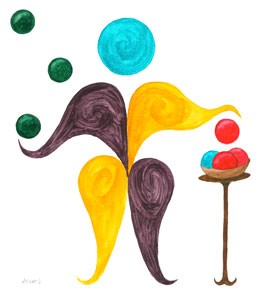As I was updating the script for the Planning Your Summer class, I felt a bit weird about the Juggling section. I mostly ignored it at the time because I couldn’t quite put my finger on the problem. The juggling metaphor has been central to how I developed all the planning classes and it seemed weird to mess with it.

Of course after the class for members of the Academic Writing Studio, as I was talking to someone about an in person workshop that combines Establishing a Writing Practice with Planning Your Summer, I realized that when thinking about summer or sabbatical there is a better metaphor. It doesn’t really replace the juggling one so much as complements it. After all, one nice thing about summer or sabbatical is that you get to set aside a lot of balls and really focus on writing.
Think of your writing like hiking.
If you hike, you probably don’t go for long multi-day walks all the time. But a long multi-day walk is pretty daunting if you haven’t been doing any hiking at all. Not just daunting, but you will take longer to get into a rhythm, need more frequent breaks, and might find it quite frustrating.
However, if you hike regularly, even for shorter distances, the muscles you need are stronger. Your boots feel more comfortable. You get into a rhythm more quickly. And it isn’t quite as much of a change to go for longer distances.
Furthermore, the length of hike you are planning will change where you hike. There are lots of lovely short routes that don’t really fit into a longer hiking plan, but are ideal when you only have time for a short hike. And when you do have time for a longer hike, you might consider something further away.
Unlike hiking, where the short hikes could also be considered training for the longer one, the scholarly writing process just involves different types of writing, some of which are much better suited to longer periods of focus. When you are deciding your priorities for the summer, you want to keep this in mind. Summer is a great time of year for long multi-day hikes, both literal and metaphorical.

Long routes and short routes overlap.
I live in the Peak District. If I were to travel all the way to Cornwall to hike the Coastal path, I might well incorporate some short spurs that would make good short walks. I’m not going to travel all the way to Cornwall to do a 3 km hike. However, if I decide to do something like hike the Pennine Way, which passes near where I live, I might prioritize the main long route noting the interesting short spurs as possibilities for short walks at other times of the year. I might also treat sections of the Pennine Way as short hikes as a way of deciding whether I want to commit to a longer multi-day walk.
You can treat your writing projects the same way. Maybe you have a project you’ve been working on in shorter blocks of time that you’d love to spend several days immersed in. Or, you have a new project that would benefit from several days to really explore the terrain, noting the paths you could come back and take later in shorter sessions.
Writing and hiking can be done alone or in groups.
Sometimes it is nice to hike write in community even if you don’t really talk to each other. And sometimes you are happy heading out on your own.
Members of the Academic Writing Studio, have support that helps them trust that they will be able to do both kinds of hiking writing. Some seasons provide more opportunity for long hikes writing sessions than others, so in the Planning Your Summer class, I remind them that this is a possibility they may want to take advantage of.
I also want you to keep hiking writing even when your other activities make it possible only to go for shorter periods of time. A Meeting With Your Writing works like a walking group. It helps you keep your commitment to hike write every week, even when you have a lot of of other things going on.
And in the summer, it’s just nice to do it in community sometimes.
Related posts:
“Write all the things” is not a summer plan
Walking on Arran and writing: the struggle is part of the process by David Peters on the Scottish Graduate School for the Arts and Humanities blog (18 June 2018) discussing a different way that your writing may be like hiking.
The Power of Walking by Fiona Noble for more on why hiking isn’t just a metaphor.
Transitioning to summer on the emotions behind the changes from ‘busy’ to less-so.
Starting your academic writing year in mid-summer radically changes the start point of the academic year, helping to change how you perceive and feel about the different cycles of the year.
A version of this post was sent to members of the Academic Writing Studio as a newsletter on May 26, 2017, related posts added June 2018.








